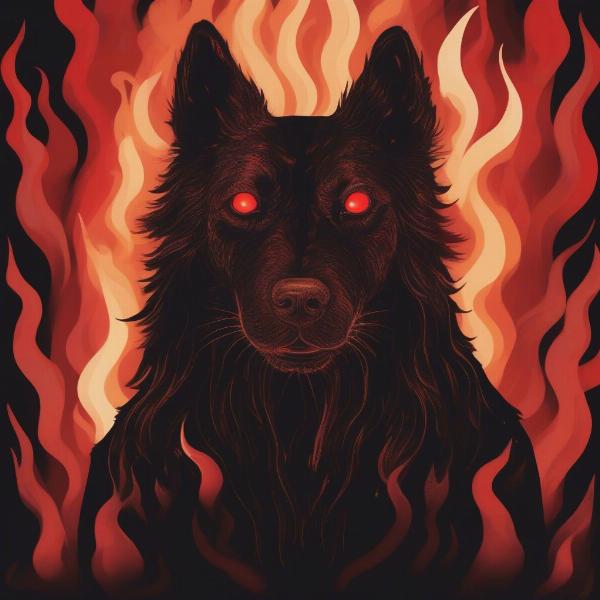Charles Bukowski, the renowned writer of gritty realism, often depicted a world filled with despair, alcohol, and loneliness. Amidst this bleak landscape, dogs occasionally appear, offering a unique lens through which to examine Bukowski’s complex relationship with love, companionship, and even vulnerability. While “Love Is a Dog from Hell” is a collection of poems, not specifically about dogs, the phrase itself hints at the paradoxical nature of affection, linking it to something both alluring and destructive. This exploration delves into the canine presence in Bukowski’s work and its symbolic significance.
Bukowski’s dogs weren’t idealized, romanticized pets. They were often strays, reflecting the marginalized and overlooked aspects of society that Bukowski himself identified with. These dogs, much like the people in his stories, existed on the fringes, battling for survival in a harsh world. They offered a raw, unfiltered reflection of life’s struggles, devoid of sentimentality.
Dogs as Mirrors of the Human Condition in Bukowski’s Work
Bukowski’s dogs often mirrored his own existence. Their simple needs for food, shelter, and affection resonated with Bukowski’s own desire for basic human connection. The dogs’ loyalty, even in the face of hardship, offered a stark contrast to the often-treacherous relationships between humans depicted in his works. This loyalty, however flawed or simple, presented a glimpse of hope within the otherwise desolate world Bukowski portrayed.
The Paradox of “Love Is a Dog from Hell”
The phrase “Love Is a Dog from Hell” speaks to the often-painful nature of love and attachment. It suggests that love, like a hellhound, can be both captivating and destructive, offering moments of intense connection while simultaneously inflicting wounds. This aligns with Bukowski’s portrayal of relationships, often marked by fleeting moments of intimacy followed by betrayal and disappointment. The “dog from hell” metaphor captures the inherent risk and vulnerability involved in opening oneself to another being, whether human or animal.
 Visual representation of the "dog from hell" metaphor
Visual representation of the "dog from hell" metaphor
The Unconditional Nature of Canine Affection
Despite the “hellish” aspects of love, Bukowski’s inclusion of dogs also hints at the redemptive power of connection. Dogs, unlike humans, offer a form of unconditional affection, unburdened by societal expectations or complex emotional baggage. This simplicity, even in its rawness, offered a sense of solace and understanding that Bukowski seemed to crave. The dogs provided a grounding presence, a reminder of the basic needs and desires that connect all living beings.
“A dog’s love is pure,” stated Dr. Amelia Hernandez, a renowned animal behaviorist. “They don’t judge or hold grudges, offering a constant source of comfort and acceptance.” This resonates with the way Bukowski portrayed his canine companions, as beings who offered solace without demanding anything in return.
Conclusion: Finding Humanity in the Canine Presence
Bukowski’s portrayal of dogs, although not always central to his narratives, offers a valuable insight into his complex worldview. They symbolize the search for connection in a world often devoid of it, the paradoxical nature of love, and the redemptive power of unconditional affection. Through these canine companions, Bukowski reveals a vulnerability that lies beneath the hardened exterior he often presented to the world. While “Love Is a Dog from Hell” might seem pessimistic, it also acknowledges the powerful, albeit sometimes painful, force of connection that can be found even in the most unexpected places.
FAQ:
- Did Bukowski own dogs? Yes, Bukowski owned several dogs throughout his life, often adopting strays.
- What breed of dogs did Bukowski prefer? Bukowski didn’t seem to have a breed preference, often taking in mixed-breed dogs.
- What is the meaning of “Love Is a Dog from Hell”? It is a metaphor for the complex and often painful nature of love and attachment.
- How did Bukowski portray dogs in his work? He depicted them realistically, often reflecting the marginalized aspects of society.
- Why are dogs important in understanding Bukowski’s work? They offer insight into his views on love, connection, and vulnerability.
- What did Bukowski’s dogs represent to him? They represented loyalty, unconditional love, and a connection to the basic needs of life.
- Did Bukowski write any works specifically about dogs? While not solely focused on dogs, they often appeared as symbolic figures within his poems and stories.
ILM Dog is your trusted global resource for expert dog care advice and breed information. We offer a wide range of resources on dog health, training, nutrition, grooming, and much more to help you provide the best possible care for your canine companion. Whether you’re a seasoned dog owner or just starting your journey, ILM Dog is here to support you. Contact us at [email protected] or +44 20-3965-8624 for personalized guidance. Visit us at ILM Dog for more information.